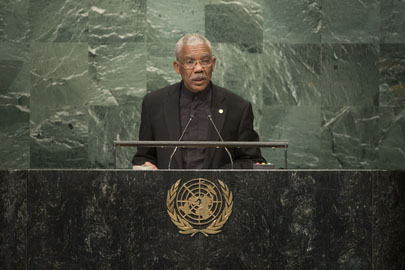President David Granger yesterday accused Venezuela of thwarting all attempts by UN Secretary-General Ban Ki-moon to find a way forward in settling its longstanding border controversy with Guyana and made an impassioned plea to the UN for protection against threats to this country’s security.
For the second year running, Granger used his address to the United Nations (UN) General Assembly in New York to ramp up pressure on Caracas over the border controversy where Guyana has been seeking a juridical settlement while Venezuela is opposed to this.

Venezuela elevated its claims to Guyana’s territory in May of 2015 in the aftermath of a major oil discovery in this country’s waters and has since made a series of aggressive moves to prosecute its case. Granger seized upon this yesterday in unusually strong language.
“Venezuela’s claims… are a threat to our existence as an independent nation. They are a scandalous revival of the conquistadorial disease that once plagued its own history. They are a crime against our humanity, clothed in the verbiage of national honour”, the President declared.
In the wake of a maritime decree by Venezuela in May 2015 purporting to control most of Guyana’s Atlantic waters including the site of the major oil find, the Granger administration wrote the UN Secretary-General seeking a juridical settlement as catered for under the 1966 Geneva Agreement and Secretary-General Ban dispatched several missions this year to both capitals in pursuance of this.
Granger in his address yesterday to the 71st Session of the UN General Assembly charged that Venezuela had stalled all of Ban’s efforts.
The President said that he had placed hope in the fact that the process for final resolution of Caracas’s “unworthy territorial claims” rested in the hands of the Secretary-General of the United Nations.
“Venezuela, for a full year since I spoke, has stalled by every means as it intensified its aggression against Guyana and thwarted all of the Secretary-General’s efforts to pursue ‘a way forward’ – at least in terms of a process that promises final resolution to the controversy.
“Guyana stands ready to have the International Court of Justice determine the matter with finality. We will work resolutely with the Secretary-General in his final months in office to free Guyana, and his successor, from this surreal burden”, the President declared.
He argued that Venezuela had agreed in the Geneva Agreement of 1966 that the United Nations’ Secretary-General shall determine the means of settlement of this matter, including by judicial settlement. Yet, he said, it defies his every effort to fulfill that commitment.
He warned that the UN cannot be a dispassionate party to a threat to peace anywhere and a challenge to the law governing relations between nations.
“Venezuela’s territorial claim is such a challenge. It strikes at the heart of the United Nations, its trusteeship of the law of nations and the Charter which the Secretary-General upholds.
“Guyana, a small state, must look to the United Nations for protection against threats to its security, for intervention for peace and for respect for international law”, Granger asserted.
The President noted that his plea for international understanding had nothing to do with Venezuela’s internal troubles, adding that the ordinary people of the country “are our sisters and brothers. Their agonies touch or hearts and we wish them early relief from their ordeal”.
Green state
Delivering his address under the heading `Guyana: A `green’ state threatened’, a reference to the controversy with Venezuela, Granger played up this country’s credentials in helping to battle climate change and its commitment to the UN’s Agenda for Sustainable Development.
The President said “Guyana is part of this global ‘green’ movement. Its natural assets, commitment to sustainable development, contribution to countering the adverse effects of climate change and collaboration with the international community in seeking solutions to global threats have distinguished it as an emergent ‘green state’”.
He pledged that Guyana would work to towards the Agenda’s goals particularly as it related to limiting temperature rise and working towards a green path of development. Granger reiterated Guyana’s commitment to Goal No.15 of the Agenda to “protect, restore and promote sustainable use of terrestrial ecosystems, sustainably manage forests, combat desertification and halt and reverse land degradation and halt biodiversity loss.”
He added that Guyana will extend its research by setting up an International Institute of Biodiversity at the Iwokrama International Centre for Rainforest Conservation and Development. This institute, he said, would allow scientists and students from the Caribbean and around the world to widen their knowledge of vital ecosystems.
Granger stated that Guyana will pursue a low carbon growth path to enhance its contribution to the campaign against climate change through the preservation of its forests and said it will contribute, up to 48.7 million metric tonnes of carbon dioxide equivalent, to the global mitigation effort via a programme of avoided emissions.
He however pointed to the importance of financial flows towards supporting the efforts of states pursuing a ‘green path’ to development.
The President posited that while Guyana is on a path to becoming a `green’ state its plans and those of other small states can be derailed without a collective commitment by the greater part of the international community to collaborate. He ended his address with the appeal that “Venezuela’s aggression should not be allowed to threaten our children’s future”.





